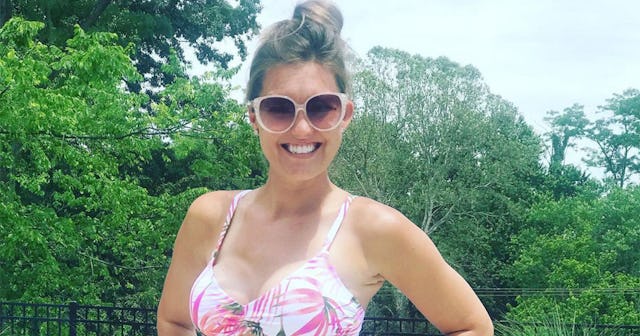My Breast Implants Turned Me Into A Rapidly Aging Zombie

I scrolled enviously through my social media feed. Many of my mom friends were on spring break with their families, enjoying hikes, beach play, and visiting national monuments. Meanwhile, I was at home on the couch, my kids running around making messes and asking for another snack. I simply didn’t have the energy to make our spring break memorable. I hadn’t felt like myself in quite some time.
I have an autoimmune disease, and I figured I was just in a very long flare up, yet the symptoms weren’t the same as before. I was exhausted, all of the time, no matter how much sleep I got or how much coffee I guzzled. I also experienced major brain fog. I would start a sentence and forget what I was talking about, or I would repeat information because I couldn’t remember that I’d already said something.
My sensory issues were amplified. I couldn’t stand noise of any kind — which is rather difficult to navigate with four kids. I also had severe light sensitivity. I’d go around the house shutting off lights, and I even spent some days wearing sunglasses indoors just to get relief. No matter how much I drank, I always felt dehydrated. My arms and hands would frequently tingle, and I would wake up to stiff, swollen joints.
Then I began developing food sensitivities. At first it was just a few foods, like avocado and strawberries. Yes, oddly, these are healthy foods! Then I couldn’t eat popcorn, fish, chocolate (I know!), sip wine, and several others. They all left me feeling inflamed.
There were days I was certain I was dying, yet medical tests showed nothing more than a slightly below norm of B12. A CT revealed constipation and a teeny kidney stone. There was nothing to sound the sirens of a medical emergency or even something moderately concerning. So why did I feel so terrible?
I was also apathetic. It was easier to just be a robot than to fake joy or anger, or any other real human emotion. I simply wasn’t myself, and it seemed like nothing I did, be it dietary changes, more or less exercise, meditation, therapy, or journaling could change it. There was no medicine for me to take, because there was no identified need for it.
A conversation with a dental hygienist changed everything. I was getting my bi-yearly cleaning and chatting with the hygienist about my medical history while she took notes. This included my autoimmune disease and my breast cancer diagnosis over three years ago. I told her I had a mastectomy and immediate reconstruction — breast implants. She asked me how that went, and I shared that though my implants looked great, they were uncomfortable and often caused me severe shoulder and rib pain.
She was empathetic, sharing that she had a friend who also battled breast cancer and opted for breast implants. After several years of chronic health issues, her friend had the implants removed and felt significantly better. Yes, I’d heard of Breast Implant Illness, but I had yet to know someone who had experienced it.
A few weeks later, I woke up one morning feeling absolutely terrible — as I usually did. I don’t know exactly why that was the day I decided to dig deeper into BII, but I did. Within just a few hours of research, I knew my implants were the root cause of my mysterious illness. I went from being an active, energetic, passionate person to a rapidly aging zombie.
My husband was working from home, and I burst into his office and said, “I want my implants out.” He whirled around a bit stunned, since we’d never discussed this before. I shared that I’d done my research, and for the first time in years, I was excited about something. I also had my mind made up that I was breaking up with my implants — ASAP.
I contacted my plastic surgeon who supportively agreed that if this is what I wanted, we would remove my breast implants and the capsules surrounding the implants. I scheduled surgery a few days later. Unfortunately, surgery was postponed several months due to rising COVID-19 cases in our area. I was disheartened by not deterred. In fact, the closer I got to my surgery date, the more certain I felt.
My story isn’t uncommon. My research has taught me that thousands of women have had their implants removed and experienced significant, positive changes in their health. Many, like me, had mysterious autoimmune symptoms but no clear diagnosis. There’s no test for BII, nor is it even an official medical diagnosis. However, ask any woman who opted to have their implants removed after being ill for months, years, and even decades, and they will tell you their truth.
My surgery was almost six weeks ago, and I can tell you that I’ve seen some major changes in my health. I have so much more energy. In fact, during my post-op recovery, I could hardly sit still and certainly couldn’t take a recommended nap. I was just awake, really awake, for the first time in over three years. I also found that some symptoms are resolving including rip and shoulder pain, constipation, sensory issues, and brain fog.
I feel like I’m re-awakening to my true self, and I’m so much happier to be flat-chested and free of my implants. It’s strange to not have faux breasts, but it’s not devastating. Gaining my health back is a tremendous gift, one I’m thankful for. I no longer sense that I’m dying, that life has no purpose, or that I am destined to be miserable. That’s hope, and it’s certainly worth saying goodbye to my breast implants.
This article was originally published on